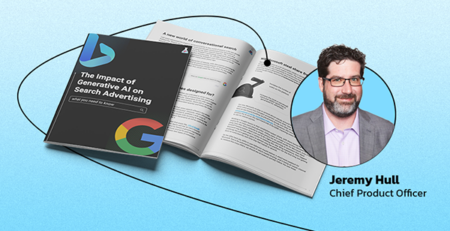PPC & SEO synergy part 2: landing page testing
This post is the second of a series of three articles: we intend to cover a series of synergies between SEO and PPC that could help your business/clients run the two channels more efficiently and optimise the overall spending.
The whole series is now live:
- Part 1: Finding Efficiencies
- Part 2: Landing Page Testing
- Part 3: Ad Copy Testing & QS Correlation with Page Speed
Part 2 includes two more synergy ideas which will be focused on the following subjects:
- Landing page testing: we recommend testing the SEO landing page for instances where SEO & PPC landing pages differ, for the same keyword/s.
- Strategy when both organic & paid results appear at the same time: we re-create a series of scenarios and recommend what tests to implement in instances where your site appears for organic and paid results for the same keyword/s.
Before reading the post below, I recommend you check part one.
Landing page testing
As you might all know, while in PPC the advertiser can pick the landing page that will be shown for a specific keyword, in the SEO world this is not possible as the search engine does the decision making.
SEOs can obviously work towards the desired outcome, mapping and optimising landing pages for specific keyword groups, making sure a search engine is able to pick the page we want – but in reality, with larger sites (e-commerce in particular) with tons of pages, this process is not as easy and straightforward as we would like.
Another difference between PPC and SEO lies in the diversity of intent between the two results:
- Generally speaking, PPC ads tend to aim for conversion – so when the landing page is picked, this happens with a site conversion in mind.
- On the other hand, Google picks organic pages based on how well they think such pages could respond to a user query: this is an important difference we have to understand.
Have a look at the example below to picture this [note: this is a very simplified example for a brand query, picked for the purpose of this post – the landing page testing synergy is applicable to a multitude of queries, not just brand ones]

| Type of Page | URL | Difference |
| PPC Page (chosen by the advertiser) | /book/25DR-lion-king/ | It sends the user to the booking page of Lion King, asking to choose a date – upper photo. |
| SEO Page (chosen by Google) | /Disney-Presents-The-Lion-King-tickets/artist/975016 | Editorial Lion King’s page which presents the musical (About section) and shows which events are taking place (Events section) – bottom photo |

When looking at some of my clients’ account, I used to run into this discrepancy a lot, which is sort of normal considering the differences between the two channels.
PPC vs SEO results
Based on what was discussed above and the example provided, does this mean Google ‘likes’ the SEO page better than the PPC page for the queries such as “ticketmaster lion king”?
- For an organic result: yes, because for informative or more generic queries, Google assumes that users are still at the top of the marketing funnel, where they are probably still browsing results – the average user wants to check the price and description of the lion king musical on Ticketmaster.
- For a paid result: no, because the main objective of this activity is a conversion, which generates money to Ticketmaster and Google: win-win.
What would happen if PPC picked the SEO informative page for their ads instead of the transactional page? Would the Quality Score be impacted as a result?
My suggestion is the following:
For keywords whose Quality Score is low, it is worth testing the SEO landing page instead of the PPC one, when there is a discrepancy between the two.
And here is why:
- A lot of times, PPC ‘lazily’ picks the destination URL without thinking too much about landing page experience (remember part one?), which is a crucial contributor to the final score, which then impacts CPC.
- Other times, PPC picks the most transactional page to help their case: SEO pages are often too far from the conversion point, which is what PPC ultimately cares about.
- However, not all keywords might require a transactional page: it is important to consider the user intent and act accordingly. If we are willing to bid on some top-of-the-funnel keywords, landing page experience and user intent should be the priority.
- Testing whether landing page experience could be easily improved by switching to the SEO page is easy and is worth trying.
How to get started
To get started, these seven steps need to happen:
- Pick keywords with a low QS (lower than 7 is a good start)
- Find out if the landing pages between the SEO & PPC results are different
- Analyse the type of keyword and intent behind it. This step is crucial: depending on the type of keyword and intent that Google associates for that particular keyword, the outcome of this test could be very different.
- Check how different the SEO & PPC pages are: how far off a conversion is the SEO page? If the SEO page is far from the conversion point, then I would expect my conversion data to be noticeably impacted if I were to use it for my PPC ads.
- Implement the SEO page in the PPC ad and keep monitoring the quality score for the keywords where the changes have been applied to.
- Keep the SEO landing page where changes have been positive, revert back if not.
- Start the process over and check your QS frequently.
Quick recap: why is this worth it?
- In some instances where the landing pages between SEO and PPC results differ, it is worth experimenting with SEO landing pages for PPC ads as this change can help you increase quality and lower your CPC.
Organic and Paid listing appearing at the same time: what to do?
I am sure you all had this conversation at some point in your SEO-SEM career: should we bid on this X set of keywords, for which we have already good organic visibility? Is there any point in having PPC ads if my SEO results are strong already?
Let me start with a clear statement: I do not have the answer and beware of the people who say that do! What I learnt in 5+ years of experience in digital marketing is that most of the time all you need to do to prove a point is to test things/assumptions: what works for one site might not work for another and so on.
I am going to re-create a series of scenarios and share my thoughts on the differences of approach that you could take when discussed what to do when organic and paid listings appear at the same time.
Scenario 1: Brand keywords, good organic positioning
Imagine the following situation:
- Keyword: brand type
- SEO situation: ranking in position 1
The key question here is the following:
Should I or should I not bid on my brand terms, using precious PPC spend if I am already ranking 1 organically?
Reasons to do bid on your brand terms:
- Brand defence: especially for highly competitive markets, you want to occupy as much search space as possible, so it makes sense. Also, for certain markets and situations your competitors (or retailers or partners) are allowed to use your brand terms in their ads, so in these situations, definitely do defend your name!
- Brand awareness: a lot of people I talk to in the industry want to see their brand bid on these terms from a credibility and brand awareness point of view. If you think that is important, then do so.
See an example where it is worth bidding on your brand keyword:
- For the query ‘halifax mortgage’ Halifax is appearing with a text ad and a couple of SEO results. It is worth noticing that there is competition for this term and that the destination URLs between the PPC ad and the first organic results are different.
- My opinion here: keep bidding on your term.

Reason to NOT bid on your brand terms:
- Save that cash: self-explanatory right? If there is no competition on that keyword and you think your SEO listing will absorb the traffic that a potential PPC ad would have attracted, then definitely consider a SEO-only approach.
Before going for it, I recommend building a testing framework that eliminates seasonality, takes into account all the other marketing channels you are running (they could skew the analysis otherwise) and then test if this is true. I have experienced tests where not bidding on brand terms makes absolute sense and the savings are quite substantial when applied to a large number of keywords: so why not explore the opportunity? It is worth reiterating that this would only work for brand terms where no other competitors are bidding on.
See an example where it might be worth NOT bidding on your brand keyword:
- For the query ‘halifax mortgage calculator’ Halifax is appearing with a text ad and a couple of SEO results. In this instance, there is no competition for this term and the destination URLs between the PPC ad and the first organic results are the same.
- My opinion here: consider an SEO-only approach.

Scenario 2: Non-brand, good organic position
Imagine the following situation:
- Keyword: non-product type, non-brand type
- SEO situation: ranking in position 1
There are a lot of considerations to keep in mind here, I will mention the most important ones in my opinion:
- Volatility: are organic rankings too volatile?
- Competition: Is the competition very tough for this keyword/cluster?
If you answer is yes to any of the above, then you clearly cannot rely on SEO to consistently be at the top of the SERP. Consider PPC to hold a position at the very top instead.
But the real key question is this:
How important is this keyword to your business?
If it is very important, you want to try and use both PPC and SEO at the same time: it will guarantee more space on the SERP (especially on mobile, where space is even more precious), therefore higher CTR. If it is not as important and you are confident that your organic result is better than the competition, then you may want to use that PPC spend on something else.
See an example below where a site occupying the organic position 1 decides not to bid on PPC: fantasticcleaners.com has no ads showing for the keyword ‘find cleaner’ despite being a high volume and high competition type of term.

Scenario 3: Product keyword, good organic position
Imagine this hypothetical situation:
- Keyword: product type, non-brand
- SEO situation: ranking in position 1
- Google Shopping Ads: appearing for that keyword
As most of you know, Shopping Ads tend to appear for product-related searches where the likelihood of intent for a user is a conversion. This scenario is similar to scenario 2 and will involve the same questions: answer them with Shopping Ads in mind instead of text ads.
See an example below where a site ranks at position 1 organically and has Shopping Ad showing:
notonthehighstreet.com is appearing both on Google Shopping for ‘birthday gifts for family’ and as the top SEO result.

Scenario 4: Informative keyword, featured snippets
Imagine this fourth scenario:
- Keyword: informative/generic keyword (non-product), non-brand
- SEO situation: ranking in the answer box (featured snippets)
As most of you might know, you do not have to rank first organically to be eligible in the answer box (read this post to know more), so it is a very appealing opportunity for a lot of sites with less established organic results. As featured snippets occupy such a large portion of the SERP, it is quite evident that the user’s attention will be dragged there – the key question here is the following:
Do you think it is worth appearing for generic/informative terms where chances of conversions might be low (very top of the funnel activity)?
If you are trying to generate traffic and interest in your brand, why not consider it? The price of these keywords might be very cheap and not a lot of companies are interested in bidding in that space, so, as a result, it might be an opportunity worth exploring.
See an example below where a site ranks in the answer box and there are PPC ads appearing for the query:
Despite the fact that getyourguide.co.uk appears in the featured snippet, Airbnb still decides to bid on that particular query.

Always audit your landing pages: a must step before testing
Another key consideration relates to the major differences between PPC and SEO landing pages (refer to the previous paragraph about Landing page testing to understand this point).
When considering whether to ‘switch off’ PPC, always think about how well the SEO page/s could pick up that traffic.
Follow these steps to have a better idea:
- If PPC and SEO use the same page for a particular keyword, then this applies:
- we expect the user journey to remain the same in case the paid ads were removed, as the page between the two channels does not vary
- by removing the PPC results (same landing page), we expect SEO to absorb most of the PPC traffic and conversions
- If PPC and SEO use a different page for a particular keyword, then do the following:
- Analyse the type of keyword and intent behind it – top vs bottom of the funnel
- Check how different the SEO & PPC pages are: how far off a conversion is the SEO page? How much information and content does the PPC page display?
- If the SEO page is significantly different (more informative or further to a conversion) than the PPC page, our expectations should be adjusted accordingly: for example, it is likely the SEO page will absorb the PPC traffic but not conversions, as the path to conversion is not comparable. So, it is likely that switching off PPC in these instances will save money, but my overall number conversions will be impacted – hence, a slightly riskier approach that should be tested.
Make sure to account for the above considerations when conducting this type of testing.
Creating a table like this fictitious event example in Excel/Google Sheets can really help you:
| Keyword | PPC Landing page | SEO Landing page | Type of keyword | PPC – Steps to conversions | SEO – Steps to conversions |
| brainlabs upcoming event | brainlabsdigital.com/events/event-name/ | brainlabsdigital.com/events/ | Informative | 1 | 2 |
| book brainlabs event london | brainlabsdigital.com/events/event-name/ | brainlabsdigital.com/events/ | Transactional | 1 | 2 |
| brainlabs event-name | brainlabsdigital.com/events/event-name/ | brainlabsdigital.com/events/event-name/ | Not clear – generic | 1 | 1 |
Quick recap: why is this worth it?
- It is worth experimenting with your paid & organic listings for multiple reasons: from brand defence to awareness to saving you a lot of money (if applied on a large portfolio of keywords).
- Doing so will help you understand more about your market and your audience, with the ultimate goal of improving your PPC spend and take advantage of your SEO presence.
Part 2 of our SEO & PPC synergy series terminates here.
Check out the other 2 posts:
If you enjoyed this post, subscribe to our email list and we’ll send loads more resources!




